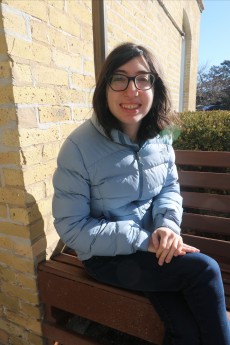A Forester you should know: Lia Niederberger
 Lia Niederberger ’18
Lia Niederberger ’18
When Lia Niederberger ’18 decided to major in politics and minor in religion, her family joked that she had chosen the two topics you aren’t supposed to talk about in polite company.
A native of Chicago’s Lincoln Park neighborhood, Niederberger is a Forester you should know.
Q: What drew you to Lake Forest College?
A: At the time that I was applying, I heard it was one of the best for schools for accommodations if you are disabled. My disability is an interesting one because it’s a combination—I was diagnosed with auditory processing disorder, which means that I have a hard time processing conversations that makes fast-paced talking particularly difficult to understand, but it also extends past auditory so that any simple task takes me longer to do than an average person. For those reasons, size was really important to me. Big, auditorium classes just can’t function for me. I also really like the location: it is far enough that it isn’t super near to home but close enough that I don’t have to fly to get home. Also, the diversity here was a draw.
Q: Have you had experiences here—besides your classes—that have helped prepare you for your future career?
A: Recently, I pushed for a Soup and Stories talk that feature disabled students, and I’m also pushing for a group on campus—a disability awareness group. I‘ve been working on it for a while and it’s finally happening.
Q: What do you do in your free time?
A: When I’m at home, I like to bake. It’s hard here because of the lack of kitchens, but I just love to bake. I recently made baked Alaska, which is quite a difficult process. It takes a few hours. There’s a ton of steps: you have to bake it, cool it, freeze it, and so on. My dad and I worked on it together.
Q: What are your plans after graduation?
A: I knew I wanted to do politics when I came here, and after taking a really interesting First-Year Studies course with Professor Benton called Saints and Sinners Chicago, I found that I wanted to learn more about a variety of religions. I don’t really know what I want to do, but I know I want to be involved with disability advocacy.
Q: Any advice for students with disabilities?
A: I know it’s easier said than done, but make yourselves noticed—get out there and keep talking to people. Most people will be understanding. And don’t be afraid to talk to professors–communicating with them about your disability is very important. First things first, I check when my professors’ office hours are and go to them whenever I need help. I get to know my professors pretty well that way.
Q: Parting words?
A: Just be open and listen to people’s experiences.
— Sophie Mucciaccio ’19